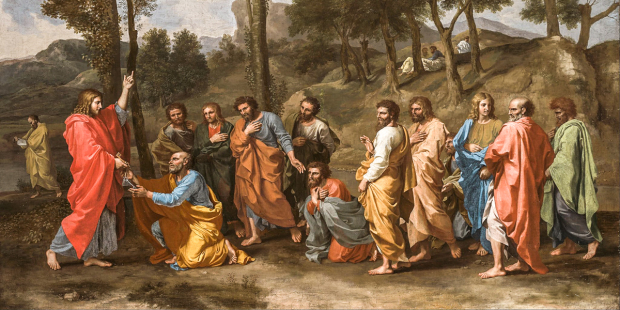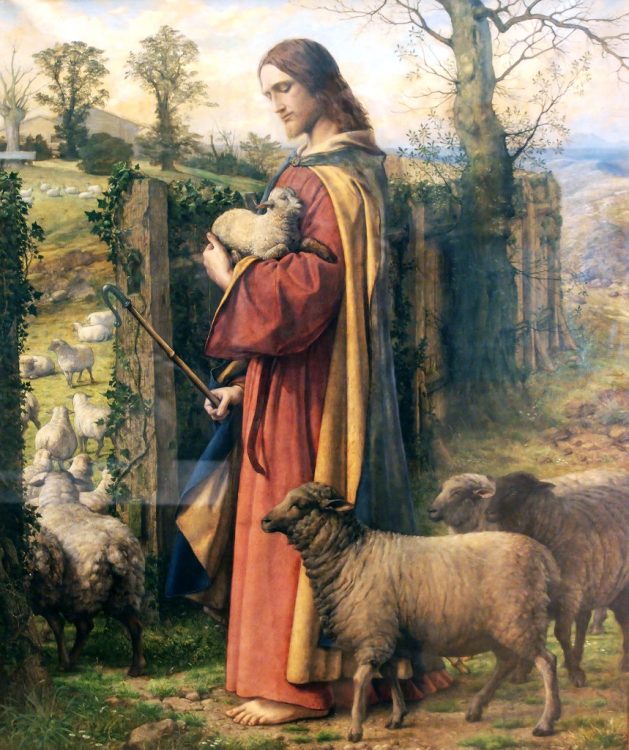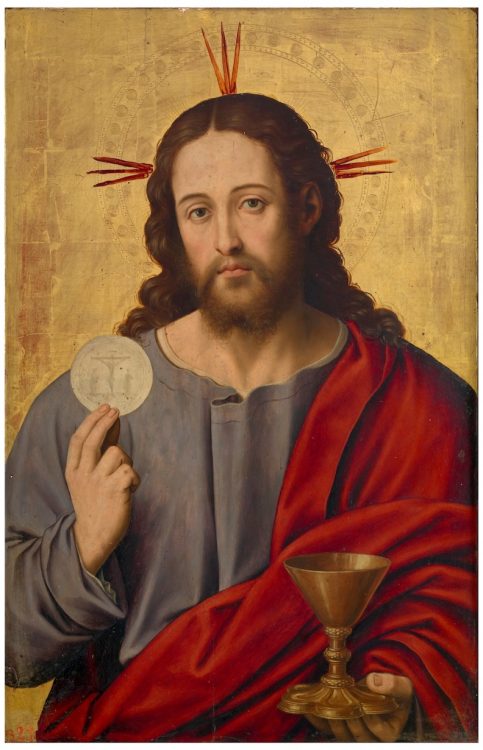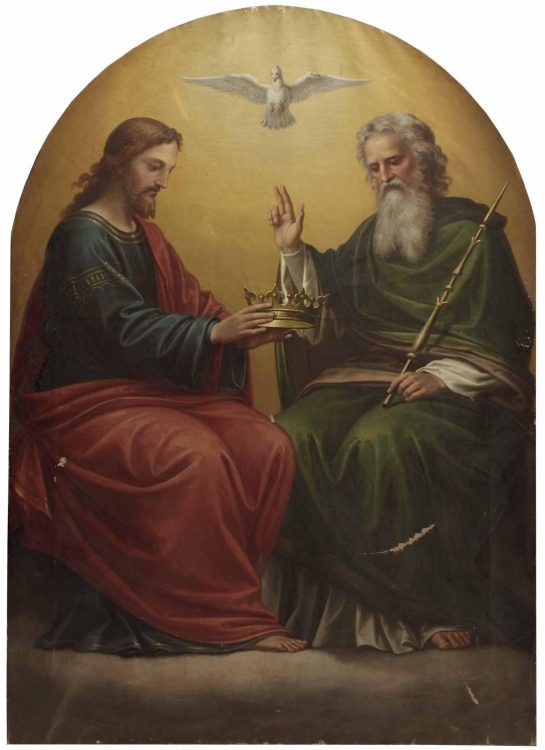Daily Reading & Meditation: Tuesday (November 5)

Fr. Gerald E. Murray: Christ’s Triumph
November 5, 2019
Saint of the Day for November 5: St. Peter Chrysologus (c. 406 – c. 450)
November 5, 2019
Jesus with apostles. web3-12-apostles-christ-nicholas-poussin-public-domain
“Invitation to the King’s banquet table”
Author Don Schwager – Scripture: Luke 14:15-24
15 When one of those who sat at table with him heard this, he said to him, “Blessed is he who shall eat bread in the kingdom of God!” 16 But he said to him, “A man once gave a great banquet, and invited many; 17 and at the time for the banquet he sent his servant to say to those who had been invited, `Come; for all is now ready.’ 18 But they all alike began to make excuses. The first said to him, `I have bought a field, and I must go out and see it; I pray you, have me excused.’ 19 And another said, `I have bought five yoke of oxen, and I go to examine them; I pray you, have me excused.’ 20 And another said, `I have married a wife, and therefore I cannot come.’ 21 So the servant came and reported this to his master. Then the householder in anger said to his servant, `Go out quickly to the streets and lanes of the city, and bring in the poor and maimed and blind and lame.’ 22 And the servant said, `Sir, what you commanded has been done, and still there is room.’ 23 And the master said to the servant, `Go out to the highways and hedges, and compel people to come in, that my house may be filled. 24 For I tell you, none of those men who were invited shall taste my banquet.'”
Meditation: What does it mean to “eat bread in the kingdom of heaven”? In the ancient world the most notable sign of favor and intimate friendship was the invitation to “share bread” at the dinner table. Who you ate with showed who you valued and trusted as your friends. A great banquet would involve a lavish meal of several courses and a large company of notable guests and friends. One of the most beautiful images of heaven in the Scriptures is the royal wedding celebration and banquet given by the King for his son and friends. We, in fact, have been invited to the most important banquet of all! The last book in the Bible ends with an invitation to the wedding feast of the Lamb and his Bride, the church: The Spirit and the Bride say, Come! (Revelations 22:17). The ‘Lamb of God’ is the Lord Jesus Christ and his bride is the people he has redeemed by his own precious blood which was shed upon the cross for our salvation.
Making light of the Lord’s gracious invitation to feast at his table
Jesus’ “banquet parable” must have startled his audience. If a great lord or king invited his friends to a banquet, why would the guests turn down his invitation? A great banquet would take many days to prepare. And personal invitations would be sent out well in advance to the guests, so they would have plenty of time to prepare for the upcoming feast. How insulting for the invited guests to then refuse when the time for celebrating came! They made light of the King’s request because they had put their own interests above his.
Excuses that hold us back from pursuing the things of God
Jesus probes the reasons why people make excuses to God’s great invitation to “eat bread” with him at his banquet table. The first excuse allows the claims of one’s personal business or work to take precedence over God’s claim. Do you allow any task or endeavor to absorb you so much that it keeps you from the thought of God? The second excuse allows our possessions to come before God. Do you allow the media and other diversions to crowd out time for God in daily prayer and worship? The third excuse puts home and family ahead of God. God never meant for our home and relationships to be used selfishly. We serve God best when we invite him into our work, our homes, and our personal lives and when we share our possessions with others.
An invitation of undeserved grace and favor
The second part of the story focuses on those who had no claim on the king and who would never have considered getting such an invitation. The “poor, maimed, blind, and lame” represent the outcasts of society – those who can make no claim on the King. There is ample room at the feast of God even for outsiders from the highways and hedges – the Gentiles who were not members of the chosen people, the Jews. This is certainly an invitation of grace – undeserved, unmerited favor and kindness. But this invitation also contains a warning for those who refuse it or who approach the wedding feast unworthily. Grace is a free gift, but it is also an awesome responsibility.
God’s grace is free and costly
Dietrich Bonhoeffer, a German pastor who died for his faith under the Nazi persecution of Jews and Christians, contrasted cheap grace and costly grace: “Cheap grace is the grace we bestow on ourselves… the preaching of forgiveness without requiring repentance… grace without discipleship, grace without the cross, grace without Jesus Christ, living and incarnate… Costly grace is the Gospel which must be sought again and again, the gift which must be asked for, the door at which a man must knock. Such grace is costly because it calls us to follow Jesus Christ. It is costly because it costs a man his life, and it is grace because it gives a man the only true life.”
God lavishes his grace upon each one of us to draw us closer to himself and he invites each of us to his banquet that we may share more deeply in his joy. Are you ready to feast at the Lord’s banquet table?
“Lord Jesus, you withhold no good thing from us and you lavish us with the treasures of heaven. Help me to seek your kingdom first and to lay aside anything that might hinder me from doing your will.”
Psalm 131:1-3
1 O LORD, my heart is not lifted up, my eyes are not raised too high; I do not occupy myself with things too great and too marvelous for me.
2 But I have calmed and quieted my soul, like a child quieted at its mother’s breast; like a child that is quieted is my soul.
3 O Israel, hope in the LORD from this time forth and for evermore.
Daily Quote from the early church fathers: The heavenly food of Jesus’ word, by Clement of Alexandria (150-215 AD)
“The holy agape is the sublime and saving creation of the Lord… An agape is in reality heavenly food, a banquet of the Word. The agape, or love, ‘bears all things, endures all things, hopes all things. Love never fails (1 Corinthians 13:8). ‘Blessed is he who eats bread in the kingdom of God’ (Luke 14:15). The most unlikely of all downfalls is charity that does not fail to be thrown down from heaven to earth among all these dainty seasonings. Do you still imagine that I refer to a meal that will be destroyed? (1 Corinthians 6:13) ‘If I distribute my goods to the poor and do not have love,’ Scripture says, ‘I am nothing’ (1 Corinthians 13:3). The whole law and the word depend on this love (Matthew 22:40). If you love the Lord your God and your neighbor (Mark 12:30-31), there will be a heavenly feast in heaven. The earthly feast, as we have proved from Scripture, is called a supper. It is permeated with love yet is not identified with it but is an expression of mutual and generous good will.” (excerpt from CHRIST THE EDUCATOR 2,1)
Meditations may be freely reprinted for non-commercial use – please cite: copyright (c) 2019 Servants of the Word, source: www.dailyscripture.net, author Don Schwager
Scripture quotations from Common Bible: Revised Standard Version of the Bible, copyright 1973, and Ignatius Edition of the Revised Standard Version of the Bible, copyright 2006, by the Division of Christian Education of the National Council of the Churches of Christ in the United States of America. Used by permission. All rights reserved. Citation references for quotes from the writings of the early church fathers can be found here.
Go to | Daily Reading & Meditation Index |
The Daily Scripture Readings and Meditations is in need of on-going development to expand resources and to reach people around the world. If you would like to contribute, you can make an online donation. |




